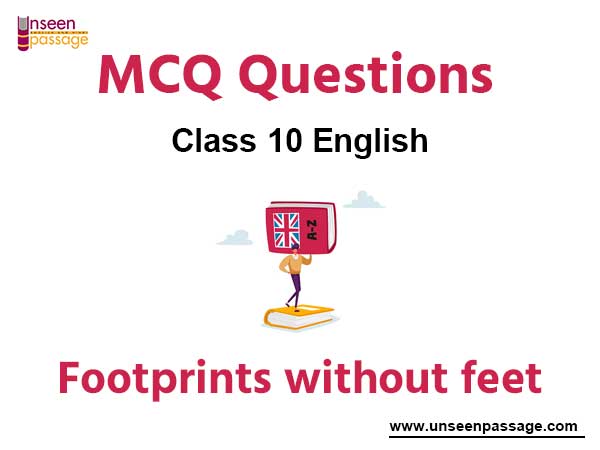Nelson Mandela Long Walk to Freedom MCQ Class 10 English
Please refer to Chapter 2 Nelson Mandela: Long Walk to Freedom MCQ Class 10 English with answers below. These multiple-choice questions have been prepared based on the latest NCERT book for Class 10 English. Students should refer to MCQ Questions for Class 10 English with Answers to score more marks in Grade 10 English exams. Students should read the chapter Nelson Mandela: Long Walk to Freedom and then attempt the following objective questions.
MCQ Questions Class 10 English Chapter 2 Nelson Mandela: Long Walk to Freedom
The Nelson Mandela: Long Walk to Freedom MCQ Class 10 English provided below covers all important topics given in this chapter. These MCQs will help you to properly prepare for exams.
Answer the following questions by choosing the correct option.
Question. Which flame can be hidden but never extinguished?
a. Man’s love
b. Man’s natural way
c. Man’s goodness
d. None of these
Answer
C
Question. How does Nelson Mandela define the meaning of ‘courage’?
a. Triumph over love
b. Triumph over selfish
c. Triumph over fear
d. Triumph over poverty
Answer
C
Question. From whom did Nelson Mandela learn the meaning of ‘courage’?
a. From his childhood friends
b. From his family
c. From the comrades in the struggle
d. From the oppressed people of his country
Answer
C
Question. What realisations did Mandela have of his boyhood freedom?
a. It was just an illusion.
b. He was born free.
c. Freedom was meant for kids.
d. He had no realisations.
Answer
A
Question. How many seats out of 400 did Mandela’s African National Congress party win in the first democratic elections of South Africa’s history?
a. 356
b. 252
c. 237
d. 328
Answer
B
Question. For decades, ________________ had been the seat of white supremacy.
a. Rockstone amphitheatre
b. Sandstone amphitheatre
c. Glassstone amphitheatre
d. None of these
Answer
B
Question. What is ‘apartheid’?
a. A political system that separates people according to their race.
b. A political system that unites people according to their religious beliefs.
c. A political system that separates people according to their religious beliefs.
d. A political system that unites people according to their race.
Answer
A
Question. Why were two National Anthems sung?
a. To imply unity
b. To mark the end of racial discrimination
c. To mark the end of gender discrimination
d. Both a. and b.
Answer
D
Question. How was Nelson Mandela feeling on the day of the inauguration?
a. He was feeling proud of himself.
b. He was overwhelmed with a sense of history.
c. He felt discouraged and discriminated.
d. None of these
Answer
B
Question. Who was sworn in as first deputy president?
a. Zenani
b. Mr de Klerk
c. Thabo Mbeki
d. Nelson Mandela
Answer
C
Read the following extracts carefully and answer the questions that follow by choosing the correct option.
Never, never, and never again shall it be that this beautiful land will again experience the oppression of one by another.
The sun shall never set on so glorious a human achievement.
Question. Which experience of oppression is referred here?
a. The experience of the Blacks being oppressed by the White people.
b. The experience of slavery.
c. The experience of tragedy.
d. The experience of being feared.
Answer
A
Question. What does the expression, ‘the sun shall never set here’, imply?
a. That the summer shall be long this year
b. That every household should have access to light
c. That the sun of liberty shall never set and their country should enjoy freedom
d. That every city must be well lit even during the night time
Answer
C
Question. How can Mandela’s government be described?
a. First democratic, non-racial government
b. A government elected through unfair means
c. First government formed by the people of colour
d. A government elected through fear and bribes
Answer
A
Question. What did the ‘site of rainbow’ refer to at Mandela’s oath taking ceremony?
a. Presence of a people of colour
b. Presence of a beautiful rainbow
c. Presence of people of different colours and nations
d. None of these
Answer
C
Question. Which word from the following means the same as ‘accomplishment’?
a. Achievement
b. Oppression
c. Glorious
d. Experience
Answer
A
Read the following extracts carefully and answer the questions that follow by choosing the correct option.
In life, every man has twin obligations — obligations to his family, to his parents, to his wife and children; and he has an obligation to his people, his community, his country.In a civil and humane society, each man is able to fulfil those obligations according to his own inclinations and abilities. But in a country like South Africa, it was almost impossible for a man of my birth and colour to fulfil both of those obligations. In South Africa, a man of colour who attempted to live as a human being was punished and isolated.
Question. What are the twin obligations related to? They are related to duty towards one’s:
a. family and country.
b. children and parents.
c. Only family
d. Only country
Answer
A
Question. Everybody is able to fulfil the obligations according to their own:
a. inclinations and abilities.
b. likings and dislikings.
c. choices and tastes.
d. limitations and competencies.
Answer
A
Question. The fulfilment of the twin obligations is only possible in a:
a. modern society.
b. foreign country.
c. civil and humane society.
d. social society.
Answer
C



